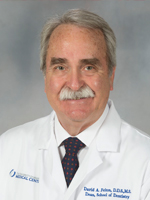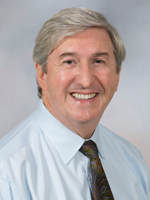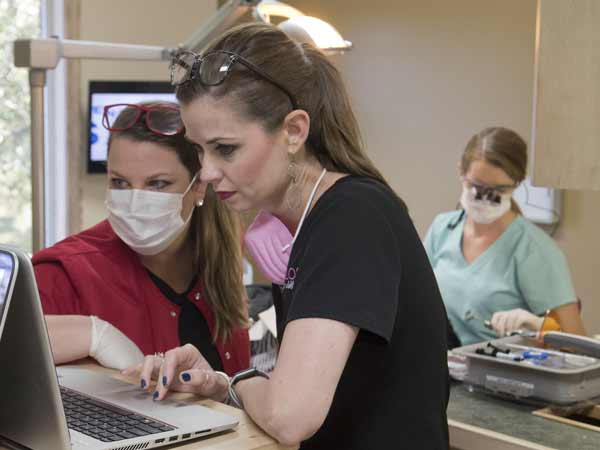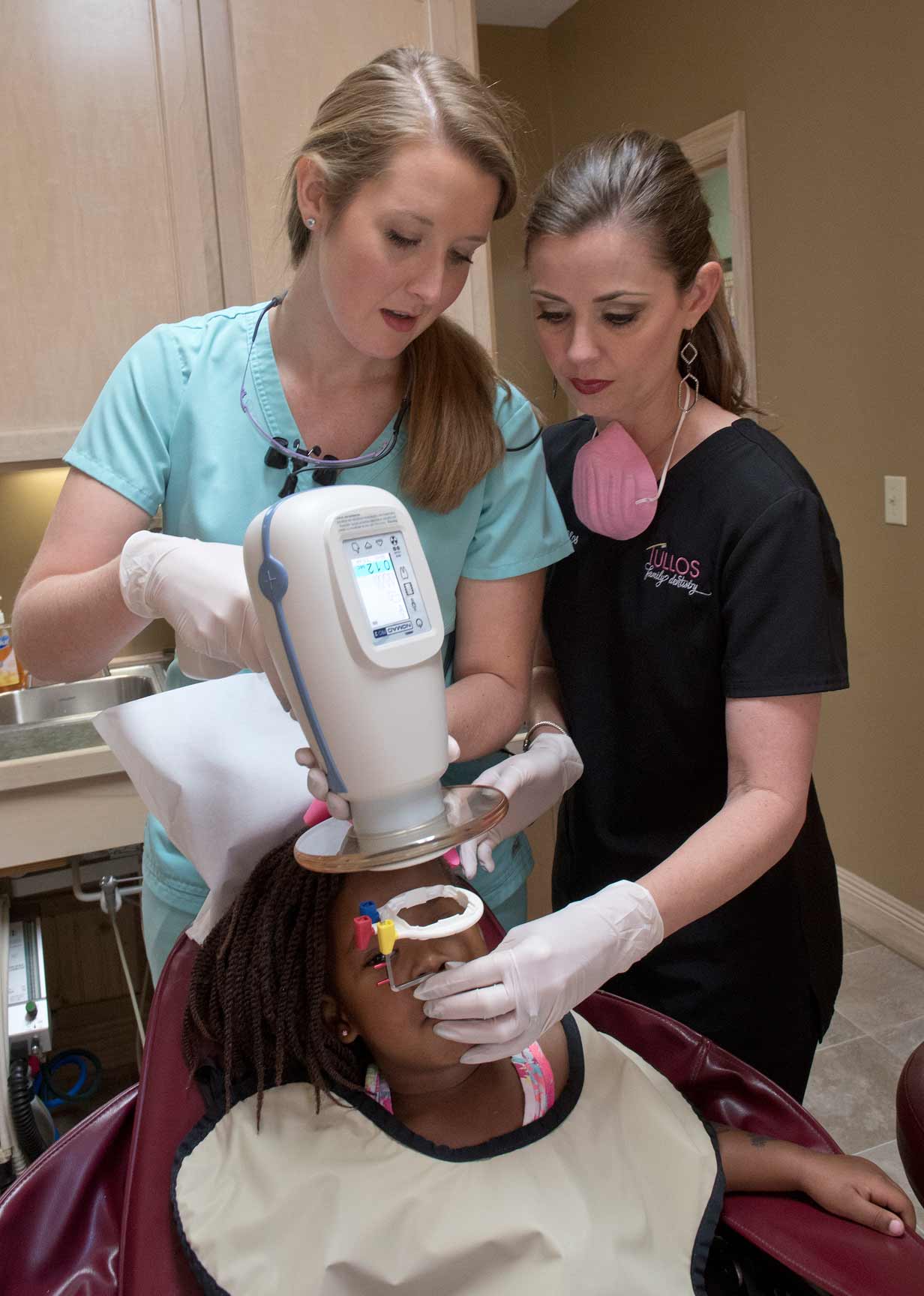New program places dental students in rural communities

Published in News Stories on October 13, 2016
On October 7, a group of students from the University of Mississippi School of Dentistry became the first to complete a new six week-long program practicing in private dental clinics throughout the state. The Community Outreach Dental Externship is in its infancy, but it is already providing wins for all involved: the students, the school and rural Mississippians.
Jamie Hargett Howard, who is from Oxford and now lives in Flowood, was placed in the Raleigh practice of Dr. Stephanie Tullos, a 2003 graduate of the SOD. Tullos built her practice from the ground up as the only dentist in the small town of Raleigh.
“My first day, I walked into the office, and Dr. Tullos asked me if I wanted to do a surgical extraction,” Howard said. “I knew from day one that this was going to be an invaluable experience.”

Felton
When Dr. David Felton accepted the position of dean less than a year ago, he brought with him the idea of sending students out to treat patients at dental clinics across the state in their final year of school. Students would be placed in underserved areas to gain clinical experience that would count toward their course requirements, provide care at a reduced cost for the uninsured and underinsured and give students a feel for the private practice environment.
"The CODE program gives our students the added experiences of providing clinical care to patients that the Jackson area doesn't supply, the opportunity to see, first hand, how a private dental practice works, the opportunity to see that a rural practice can be a good practice location, and clinical credit towards graduation requirements for our D4 students,” Felton said.
Felton assigned the task of organizing the program to Dr. John Smith, associate professor in Care Planning and Restorative Sciences and assistant dean for admissions. Smith said that the first step to creating the program was to present the idea to the Mississippi State Board of Dental Examiners, which the school did in May.

Smith
“We've had a program in the past that was an observation period,” Smith said. “Students could go to an office and watch, just watch. The state board gave us permission for the students to provide care with the exception that students cannot receive any compensation from the practice.”
Smith compiled information about the proposed program to submit to the Commission on Dental Accreditation. The Commission gave permission to start the program and will evaluate it during the dental school's accreditation site visit scheduled for February 2017.
Smith then took a page from the playbook of UMMC's Department of Family Medicine, which has a program that sends medical students on a community rotation.
“I got their agreement, legal and compliance forms and modified them to fit our dental needs,” Smith said. “That really sped things up through legal, compliance and human resources. It gave us a basic template to start with.”
Once all the paperwork was in place, Smith began to recruit clinician educators - dentists in rural areas of Mississippi willing to host students.
“I had a core group of people in mind,” Smith said. “I knew these were practitioners to whom I would send my children. I had no worries about sending students out to these practices.”

Tullos, left, and Sullivan view the patient's digital health record while Howard treats the patient in the background.
“When Dr. Smith asked me to be a clinical advisor, I thought it was a good idea,” Tullos said. “I enjoy teaching and explaining the procedures. Both of my parents were teachers, and I guess I have it in my blood.”
The clinical educators sign a formal, five-year agreement with the SOD, but they receive no monetary compensation. “They are not getting paid for this. They are doing it out of the goodness of their hearts,” said Smith. “We have good people here in Mississippi.”
The school is working to offer continuing education for the clinical educators at employee cost. They also have access to the Rowland Medical Library and campus email.
The pilot program was pulled together in just four short months. Smith said that a lot of the credit goes to administrative assistant Sandra Johnston. “Sandra has her plate full right now, but she has done a remarkable job. We started in the middle of May, and we received approval from CODA at the end of July,” Smith said. “It was a fast process. We worked pretty hard to get it done.”
The second group began their rotation three days after the first finished, and the final group will begin in January. Students spend six weeks in the assigned clinic, enough time to complete procedures that require multiple visits over time. Smith said that the length of the rotation will be evaluated and adjusted, if needed, once the pilot year of the program is completed.

Howard, left, takes an x-ray of pediatric patient Kassidee Watson of Bay Springs as Tullos, left, assists.
The students must complete one year of clinical practice, treating patients at the SOD, before they are eligible for the CODE program. Smith said that there is a suggested number of each basic dental procedure - such as crowns, dentures and fillings - that students should complete before going out on rotation. Those who had already met the goals were chosen for the first rotation.
From the information Smith has gathered so far, it seems that students placed in the more rural practices are getting the most experience. Smith said this was likely due to the shortage of dentists in rural Mississippi. Dental practices in rural areas tend to see more basic dental needs of the type in which the students need experience: periodontal treatments, dentures, partials, fillings and single unit crowns.
Howard said that at first she was apprehensive about going on the rural rotation, but that changed on the first day at Tullos Family Dentistry. Since then, she has completed more than 200 dental procedures, mostly on pediatric patients with limited access to care and limited financial resources.
“Jamie has been accepted to a periodontal residency at UAB,” said Smith. “After the second week of her externship, I approached her to ask if she would like for me to arrange for her to spend the final four weeks of her rotation at a periodontal office. She almost teared up and said, 'Please don't take me away from Dr. Tullos. I can't tell you how much I'm learning from her.'”
Many of the procedures will count towards Howard's graduation requirements. Smith said that students must provide documentation for each procedure in the form of radiographs or models in order to meet the CODA requirements on credit for procedures performed outside of the school. The school is also tracking the dollar amount of uncompensated care given to Mississippi residents by the students.

Howard completed more than 200 procedures during the six weeks of the program.
“Dr. Tullos helped me significantly increase my speed and efficiency by teaching me new clinical techniques, encouraging me to always consider the best and fastest way to complete each task and at times insisting I pick up the pace,” Howard said. “The staff was incredible and treated me like a dentist every day.”
Tullos said that taking the students out of the structured environment of school allows them to see what it will be like in the “real world” of dentistry.
“In the dental school, protocols and checks from instructors make the procedures more time consuming,” Tullos said. “In a private practice, there is a strict schedule because patients have taken off work to be there. They don't have all day or even half a day. This program allows students to put into practice what they've learned in “real time.”
Beyond checking off procedure requirements for graduation, Howard said she gained experience in running a private practice.
“Dr. Tullos took time between patients to explain her practice management methods to me,” Howard said. “She walked me through each step in setting up a successful practice - from employee management to evaluating productivity versus expenditures. The staff was extremely helpful in explaining insurance matters, collections for procedures executed and how to handle specific situations with patients.
“Dr. Tullos is an inspiration to women in dentistry.”
Tullos said that she had a good experience with Howard. “I was lucky to get her,” she said. “I'm sure they are all good students, but she and I really clicked and developed a great relationship from day one. I look forward to having another student.”
Though only in its pilot year, the CODE program promises to be an invaluable addition to the curriculum of Mississippi's dental students.
“It's a win-win proposition for us,” Felton said. “We're excited to be able to offer this new training opportunity to our clinical educator faculty and our students.”


